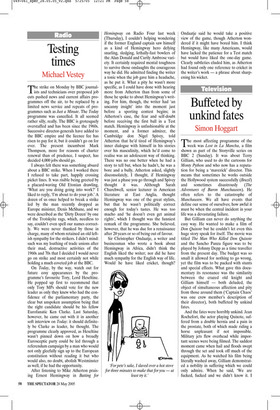Testing times
Michael Vestey
The strike on Monday by BBC journalists and technicians over proposed job cuts pushed news and current affairs programmes off the air, to be replaced by a limited news service and repeats of programmes such as Just a Minute. The Today programme was cancelled. It all seemed rather silly, really. The BBC is grotesquely overstaffed and has been since the 1960s. Successive director-generals have added to the BBC empire and the licence fee has risen to pay for it, but it couldn’t go on for ever. The present incumbent Mark Thompson, more for reasons of charter renewal than of prudence, I suspect, has decided 4,000 jobs should go.
I always felt there was something absurd about a BBC strike. When I worked there I refused to take part, happily crossing picket lines. It was risible being greeted by a placard-waving Old Etonian drawling, ‘What are you doing going into work?’ I liked to reply, ‘I’m about to do your job.’ A dozen of us once helped to break a strike led by the man recently dropped as Europe minister, Denis McShane, and we were described as the ‘Dirty Dozen’ by one of the Trotskyite rags, which, needless to say, couldn’t even spell our names correctly. We were never thanked by those in charge, many of whom retained an old leftish sympathy for the strikers. I didn’t mind: such was my loathing of trade unions after their mad, destructive activities of the 1960s and 70s that I decided I would never go on strike and most certainly not while holding a much coveted job at the BBC.
On Today, by the way, watch out for future cosy appearances by the programme’s favourite Tory, Lord Heseltine. He popped up first to recommend that only Tory MPs should vote for the new leader as only they knew who had the confidence of the parliamentary party, the clear but unspoken assumption being that the right candidate should be his fellow Eurofanatic Ken Clarke. Last Saturday, however, he came out with it in another soft interview on Today: it should definitely be Clarke as leader, he thought. The programme clearly approved, as Heseltine wasn’t pinned down on how a broadly Eurosceptic party could be led through a referendum campaign by a man who would not only gleefully sign up to the European constitution without reading it but who would also, no doubt, abolish Westminster as well, if he had the opportunity.
After listening to Mike Atherton praising Ernest Hemingway in Batting for Hemingway on Radio Four last week (Thursday), I couldn’t helping wondering if the former England captain saw himself as a kind of Hemingway hero defying snarling, sledging, lethally-fast bowlers of the Alan Donald and Curtly Ambrose variety. It certainly required mental toughness to survive those onslaughts the courageous way he did. He admitted finding the writer a tonic when the job gave him a headache, as he put it. What a pity he wasn’t more specific, as I could have done with hearing more from Atherton than from some of those he spoke to about Hemingway’s writing. For him, though, the writer had ‘an uncanny insight’ into the moment just before a sporting contest begins; in Atherton’s case, the fear and self-doubt before receiving the first ball in a Test match. Hemingway is unfashionable at the moment, and a former admirer, the Cambridge don Nigel Spivey, told Atherton that he’d tired of Hemingway’s inner dialogue with himself in his stories over his masculinity, which he’d come to realise was an adolescent way of thinking. There was no one better when he had a story to tell but, when he hadn’t, he was a bore and a bully. Atherton asked, slightly disconsolately, I thought, if Hemingway was just a phase you go through and Spivey thought it was. Although Sarah Churchwell, senior lecturer in American literature at East Anglia, thought Hemingway was one of the great stylists, but that he wasn’t politically correct enough for today’s tastes. He was too macho and ‘he doesn’t even get animal rights’, which I thought was the funniest remark of the programme. She believed, however, that he was due for a renaissance after 20 years or so of being out of favour.
Sir Christopher Ondaatje, a writer and businessman who wrote a book about Hemingway in Africa, didn’t think the English liked the writer; nor did he have much sympathy for the English way of life. Would he have liked cricket, though? Ondaatje said he would take a positive view of the game, though Atherton wondered if it might have bored him. I think Hemingway, like many Americans, would have lacked the patience for a Test match but would have liked the one-day game. Clearly subtleties eluded him, as Atherton had found only one reference to cricket in the writer’s work — a phrase about sharpening his wicket.






















































 Previous page
Previous page